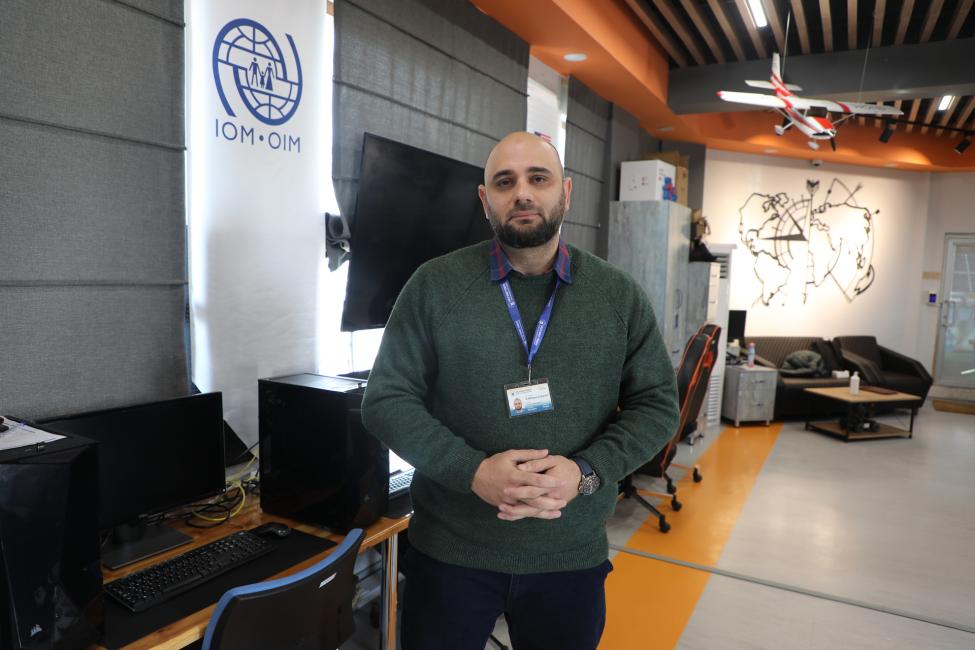-
Who We Are
WHO WE AREThe International Organization for Migration (IOM) is part of the United Nations System as the leading inter-governmental organization promoting humane and orderly migration for the benefit of all. IOM has had a presence in Türkiye since 1991.
About
About
IOM Global
IOM Global
-
Our Work
Our WorkAs the leading inter-governmental organization promoting since 1951 humane and orderly migration, IOM plays a key role to support the achievement of the 2030 Agenda through different areas of intervention that connect both humanitarian assistance and sustainable development. Across Türkiye, IOM addresses the full scope of migration issues, supporting and developing government capacity to manage migration.
Cross-cutting (Global)
Cross-cutting (Global)
- Data and Resources
- Take Action
- 2030 Agenda
Gaziantep – In July 2023, the International Organization for Migration (IOM) and Field Ready Türkiye collaborated to implement the first-ever Start Ready programme. The programme gathered five teams of innovators at the Resilience Innovation Facility (RIF)*, brainstorming solutions to tackle humanitarian challenges after the February 2023 earthquakes.
Three months later, learn from Field Ready and members of the winning team how they are progressing with their solutions.
Could you please give a brief information about your organisation and the Start Ready programme?
Al Mothana Al Shareef (Programme Coordinator, Field Ready Türkiye): Field Ready Türkiye is a group of engineers, humanitarian aid and development experts. We have been working in Türkiye and Syria since 2016. We are a social community organisation supporting localised, sustainable solutions.
We started implementing the project by conducting needs assessments in Nurdağı and Islahiye, the target regions [affected by the earthquakes]. After the needs assessment, some challenges emerged that we wanted to solve.
We announced these challenges and the important goal of the project. We started a call for applications for innovation teams. Eventually, we formed five innovation teams and provided them with training and mentorship for two months.
Within two months, the teams came up with five different ideas. Then they competed by presenting their innovative ideas to a panel of experts. The top two teams won grants to further develop their products.
Can you tell us about your team?
Giyas Aletek (Computer Engineer, Team Member): I am a computer engineer. Everyone in our team is experienced with an engineering background. We came together with people from different cultures and formed this team. After the devastating earthquakes, we decided to do something about it. We wanted to ensure that communities are less impacted by such disasters. We eventually joined the Start Ready programme and built a prototype. We are currently continuing to work on our solution idea and trying to make it applicable in the field.
Which problem does your solution aim to solve, and how?
Husam Khankan (Software Engineer, Team Leader): We worked for five months to produce the first prototype of our Early Response and Rescue System (ERRS). Our ERRS project is mainly a solution for disaster management, aimed at getting real-time information about where people under rubble are and how to rescue them and get them out quickly. This is one way to do it.
The other way this box works is that it serves smart devices when there is no earthquake or emergency and allows internet access to all smart devices in the country. It's very highly praised by companies who need access to the internet for their devices.
What progress have you made with your project?
Odai Assaf (Software Engineer, Team Member): After five months of working on our project, we have reached the final stage, which is the innovation stage, where we transform our project from a prototype to a project implemented in the field.
In the previous phase, we prepared and tested this prototype, we did all the work related to the solution, including software, dashboard and mobile application. The prototype stage and training sessions have ended, and we have moved on to the stage of seeking investors.
We are currently building the actual product, not the prototype. It needs to be one-tenth of the [required] power consumption, 20 percent of the weight and much cheaper. We aim to have this product ready in six months.
How have the participating team benefitted from this initiative?
İpek Çılgın (Senior Project Assistant, IOM Türkiye): All teams received business and entrepreneurship training sessions, two months of mentorship and consultation services, the opportunity to develop, test, and refine their prototypes at the Resilience Innovation Facility, and the opportunity to network with and pitch their ideas to key stakeholders. This included local authorities, IOM, the Disaster and Emergency Management Authority (AFAD), the Ministry of Industry and Technology, and the Turkish Red Crescent. The Pitching Day and selection of winners was held on 30 November 2023. Two winning teams each received a USD 2,000 cash grant to enhance their idea or expand their business.
The ERRS project is particularly valuable. By establishing an efficient rescue plan and delivering real-time information on the precise locations of individuals trapped under rubble during disasters, this solution significantly improves disaster response efforts. This is especially important for vulnerable groups, including migrants and refugees.
Through providing timely assistance, the solution helps mitigate the risks and impacts of disasters on vulnerable people, aligning with IOM's commitment to protecting the rights and dignity of all individuals.
*IOM’s Resilience Innovation Facility (RIF), in partnership with Gaziantep University, combines a state-of-the-art digital fabrications laboratory with targeted programming focused on skills building, entrepreneurship and social cohesion among migrant, refugee and local communities. The Start Ready programme was supported by the U.S. Department of State's Bureau of Population, Refugees, and Migration (PRM).




